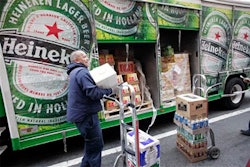BOISE, Idaho (AP) — Idaho's $2 billion milk industry failed to convince Congress this month to pass the new federal farm bill and its provisions to help dairies mitigate rising grain costs and volatile markets that have pushed them to three quarters of losses.
Though a farm bill cleared the U.S. Senate, it's languished in the House.
Republican House leaders say they didn't have the votes, with conservatives demanding greater cuts in the bill's big food stamp program and Democrats opposing such deep austerity measures. After Congress quit Saturday, the $100 billion farm bill likely won't be voted on until after the Nov. 6 presidential election.
Bob Naerebout, director of the Idaho Dairymens Association, said Wednesday his members are disappointed by the delay, as they want the dairy-related provisions enacted quickly to help them re-emerge from nine months of losses. While grain farmers can wait until next planting season, he said dairies need relief now from rising feed prices that have driven dairies' costs above profitable levels.
"We harvest a crop every day, 365 days of the year," Naerebout said. "It's critical for us to have stability in the farm bill."
Idaho's roughly 553,000 dairy cows and 560 licensed dairies make the state America's third-biggest dairy producer, with about $2 billion in cash receipts. Only California's and Wisconsin's dairy industries are bigger.
But sheer size doesn't equal profitability.
To help make good on losses, Naerebout's members want the federal government to suspend impending new ethanol requirements for gasoline. Ethanol is made from corn, putting refineries in competition with farmers and boosting prices.
But the farm bill was a big hope, too.
The Idaho Dairymens Association has joined similar groups in other states that are pushing the bill's provisions that replace dairy subsidies with an insurance program, to pay farmers when the profit margin evaporates on their milk products. Other changes call for production cuts when demand falls short of supply.
It wasn't these dairy provisions that stalled a 2012 farm bill vote, however.
Rather, stumbling blocks have included differences over how the farm bill's other, higher-profile components should address competing demands: Helping low-income families eat, while still contributing to debt reduction.
The food stamp program costs nearly $80 billion a year, 80 percent of the farm bill's spending. House conservatives say that's too generous; some Democrats said cuts to the food stamp program were unacceptable.
In the Senate, Idaho U.S. Sens. Mike Crapo and Jim Risch of Idaho voted against the farm bill in June, but it passed 65-35.
In the House, a bill cleared the Agriculture Committee but never got a floor vote despite a dairy industry-backed letter — signed by dozens of House members — sent Sept. 14 asking the chamber's leaders to let lawmakers vote on the bill.
Republican U.S. Rep. Mike Simpson, R-Idaho, signed, too, hoping for a speedy vote to help his constituents in Idaho's dairy country.
"Congressman Simpson thinks Congress should be in session working on that bill, in particular," said Nikki Watts, Simpson's spokeswoman in Boise, on Wednesday. "The Senate has passed a bill, the House needs to pass a bill."
But GOP Rep. Raul Labrador declined to join the letter-signers, though the dairy industry sought his backing, too.
Labrador, a deficit hawk, said Wednesday through a spokesman he wants Congress to do more to rein in the farm bill's overall costs, especially the food stamp program.
Spokesman Phil Hardy didn't immediately comment on Labrador's position on the dairy provisions.






















